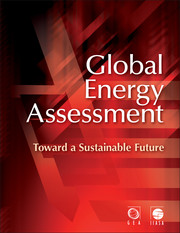Book contents
Chapter 5 - Energy and Security
Published online by Cambridge University Press: 05 September 2012
Summary
Executive Summary
Uninterrupted provision of vital energy services (see Chapter 1, Section 1.2.2) – energy security – is a high priority of every nation. Energy security concerns are a key driving force of energy policy. These concerns relate to the robustness (sufficiency of resources, reliability of infrastructure, and stable and affordable prices); sovereignty (protection from potential threats from external agents); and resilience (the ability to withstand diverse disruptions) of energy systems. Our analysis of energy security issues in over 130 countries shows that the absolute majority of them are vulnerable from at least one of these three perspectives. For most industrial countries, energy insecurity means import dependency and aging infrastructure, while many emerging economies have additional vulnerabilities such as insufficient capacity, high energy intensity, and rapid demand growth. In many low-income countries, multiple vulnerabilities overlap, making them especially insecure.
Oil and its products lack easily available substitutes in the transport sector, where they provide at least 90% of energy in almost all countries. Furthermore, the global demand for transport fuels is steadily rising, especially rapidly in Asian emerging economies. Disruptions of oil supplies may thus result in catastrophic effects on such vital functions of modern states as food production, medical care, and internal security. At the same time, the global production capacity of conventional oil is widely perceived as limited. These factors result in rising and volatile prices of oil affecting all economies, especially low-income countries, almost all of which import over 80% of their oil supplies.
- Type
- Chapter
- Information
- Global Energy AssessmentToward a Sustainable Future, pp. 325 - 384Publisher: Cambridge University PressPrint publication year: 2012
References
- 40
- Cited by

